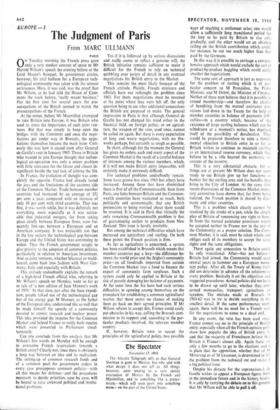EUROPE —
N Tuesday morning the French press gave
only a very modest amount of space to Mr Harold Wilson's speech the evening before at the Lord Mayor's banquet. In government circles, however, his trial balloon for a European tech- nological community was taken with the utmost seriousness. Here, it was said, was the proof that Mr Wilson, as he had told the House of Com- mons the week before, 'really meant business.' For the first time for several years the pre- occupations of the British seemed to match the preoccupations of the French.
At the outset, before Mr Macmillan attempted to take Britain into Europe, it was Britain who used to stress the importance of such joint ven- tures. But that was simply to keep open the bridges with the Continent and once the nego- tiations got under way in Brussels, the nego- tiations themselves became the main issue. Curi- ously this was how it stayed even after General de Gaulle's veto in January 1963. Those in Britain who wanted to join Europe thought that techno- logical co-operation was only a minor problem with little relevance for the future and almost in- significant beside the real task of joining the Six.
In France, the evolution of thought was com- pletely the opposite. France had already tasted the joys and the limitations of the customs side of the Common Market. Trade between member countries had increased by an average of 13f per cent a year, compared with an increase of only 10 per cent with third countries. That was fine, it was worth while, but it was definitely not everything, more especially as it was notice- able that industrial mergers, far from taking place chiefly between European firms, were fre- quently link-ups between a European and an American company. It was noticeable too that in the key sectors the technological gap between Europe and the United States was continuing to widen. Thus the French government sought to give priority to the adoption of common policies, particularly in relation to American investment. And so joint ventures, whether bilateral or multi- lateral, came back into fashion with West Ger- many, Italy and especially with Britain.
This attitude undoubtedly explains the remark of a high-level French official who, referring to Mr Wilson's speech on Monday, went so far as to talk of 'a new edition of Jean Monnet's work of 1956.' At that time, just after the Suez expedi- tion, people talked not of the technological gap but of the energy gap. M Monnet, as the father of the European idea, understood this so well that he made himself the apostle of a community devoted to atomic research and nuclear power. This idea provided the impetus for the Common Market and helped France to ratify both treaties which were presented to Parliament simul- taneously.
Can one conclude from this analysis that Mr Wilson's few words on Monday will be enough to overcome French reservations towards a British entry? Clearly not, since there is obviously a long way between an idea and its realisation. The setting-up of common research funds and of a common pool for government orders in every case presupposes common policies—with all this means for defence—and the procedures necessary to decide priorities, case by case, will be bound to raise awkward political and institu- tional problems. Yet if it is followed up by serious discussions and really seems to reflect a genuine will, the British initiative remains sufficient to make it difficult for the French to rely on technical quibbling over points of detail in any eventual negotiations for British entry to the Market.
This remains the most likely forecast of the French attitude. Plainly, French ministers and officials have not rethought the problem since 1963. For them, negotiations must be resumed at the point where they were left off, the only question being to see what additional concessions the British are prepared to make. The general impression in Paris is that although General de Gaulle has not changed his mind either in the financial field, on foreign policy, or on agricul- ture, the weapon of the veto, used once, cannot be called on again. But there is every expectation of lqng and weary negotiations, with no fire- works perhaps, but certainly as tough as possible.
In short, although for the moment the General has given no orders, each and every aspect of the Common Market is the result of a careful balance of interests among the various members, which, if it will not make British entry impossible, will certainly make it extremely difficult.
For technical problems undoubtedly remain. Some have grown less since 1963 but others have increased. Among those that have diminished there is first of all the Commonwealth. Seen from Paris, any links between Britain and the Common- wealth countries have weakened so much, both politically and economically, that any British pretensions to being worried about them would be resented. It is said in Paris that virtually the only remaining Commonwealth problem is that of guaranteeing outlets to products from New Zealand. This issue is hardly insoluble.
The Judgment of Paris
From MARC ULLMANN
ways of reaching a settlement arise; one would allow a sufficiently long transitional period for the levy to be paid by Britain to rise only gradually, and the other would set an absolute ceiling on the British contribution which could, for instance, be not too much higher than that paid by the Germans.
In this way it is possible to envisage a compre- hensive approach which would exclude the sort of product-by-product haggling which could easilv smother the negotiations.
The same sort of approach is just as necessary for the problem of sterling which is of par-






























 Previous page
Previous page